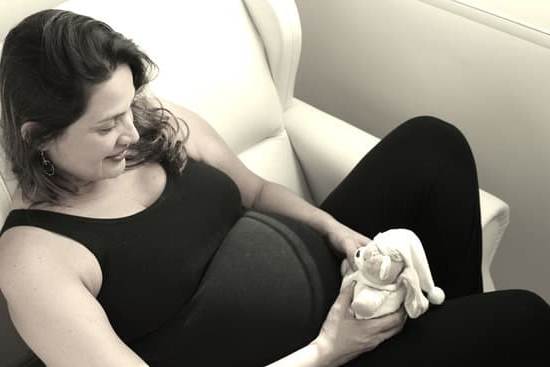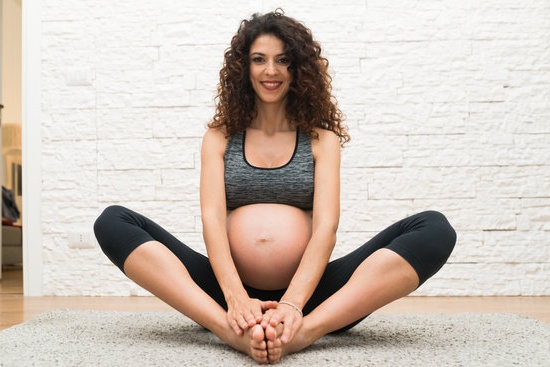Pregnancy is a beautiful and transformative journey, but it can also come with various discomforts and challenges. One common issue that many pregnant individuals experience is chest tightness. Understanding how to relieve chest tightness during pregnancy is crucial for ensuring the well-being of both the expectant mother and her growing baby.
Chest tightness during pregnancy can be attributed to several factors, including hormonal changes, increased pressure on the diaphragm due to the expanding uterus, as well as heightened anxiety and stress levels. These factors can contribute to symptoms such as shortness of breath, chest pain or discomfort, and a feeling of constriction in the chest area. Addressing these symptoms promptly is essential for maintaining physical comfort and mental peace during this special time.
As expectant mothers navigate through their pregnancies, it is vital to recognize when chest tightness may be indicative of a more serious issue that requires medical attention. Consulting a healthcare provider if experiencing warning signs such as persistent chest pain, difficulty breathing, or lightheadedness is imperative for ensuring the safety of both mother and baby.
In addition to seeking professional help when needed, incorporating home remedies, lifestyle changes, and professional treatments can all play significant roles in alleviating chest tightness and promoting overall well-being during pregnancy.
Causes of Chest Tightness During Pregnancy
During pregnancy, many women may experience chest tightness due to various reasons. One of the causes of chest tightness during pregnancy is hormonal changes. These hormonal shifts can lead to changes in the body’s respiratory system, causing feelings of constriction in the chest area. Additionally, increased pressure on the diaphragm as the baby grows can also contribute to chest tightness. This pressure can make it difficult to breathe deeply, leading to a feeling of tightness in the chest.
Another significant cause of chest tightness during pregnancy is anxiety and stress. Expecting a child can bring about a wide range of emotions, from excitement to worry, which can manifest physically as chest tightness. Stress and anxiety can result in shallow breathing patterns, exacerbating the feeling of constriction in the chest. It is essential for pregnant individuals experiencing these symptoms to find ways to manage their stress levels effectively.
To relieve chest tightness during pregnancy, there are several strategies that can be beneficial. Engaging in relaxation techniques such as deep breathing exercises can help calm the body and mind, reducing tension in the chest area. Maintaining proper posture throughout the day can also alleviate pressure on the diaphragm and promote better breathing. Additionally, using a warm compress on the chest or propping oneself up with pillows while sleeping can provide relief from chest tightness.
| Causes | Effects |
|---|---|
| Hormonal Changes | Changes in respiratory system leading to constriction |
| Increased Pressure on Diaphragm | Difficulty breathing deeply, feeling of tightness |
| Anxiety and Stress | Shallow breathing patterns, exacerbating constriction |
Symptoms of Chest Tightness
During pregnancy, many women may experience chest tightness, which can be quite uncomfortable and alarming. It is important to understand the symptoms of chest tightness during this time so that appropriate measures can be taken to alleviate it. Here are some key symptoms to look out for:
- Shortness of breath: One common symptom of chest tightness during pregnancy is feeling like you cannot take a deep breath or struggling to breathe properly. This can be due to the increased pressure on your diaphragm as your baby grows.
- Pain or discomfort in the chest: Some women may experience sharp pains or aching sensations in their chest area, which can contribute to feelings of tightness. It is essential to differentiate between normal discomfort and more serious issues like heart problems.
- Feeling of constriction: Women may also describe a sensation of tightness or squeezing around their chest, similar to being hugged tightly. This feeling can be accompanied by anxiety and stress, exacerbating the discomfort.
If you are experiencing these symptoms of chest tightness during your pregnancy, there are various ways you can find relief. One effective method is practicing breathing exercises regularly. These exercises can help improve lung function and relieve tension in the chest area. Additionally, maintaining proper posture throughout the day can also help alleviate chest tightness by ensuring optimal breathing mechanics.
Another helpful home remedy for relieving chest tightness during pregnancy is using a warm compress on the affected area. The warmth can help relax tense muscles and reduce discomfort. Additionally, elevating your upper body while sleeping with extra pillows can also aid in easing chest tightness by reducing pressure on the diaphragm and promoting better circulation.
By recognizing these symptoms of chest tightness during pregnancy and implementing these home remedies, you can effectively manage this common issue and ensure a more comfortable and healthy pregnancy journey for you and your baby. Remember, if you have any concerns or if the symptoms persist or worsen, do not hesitate to consult with your healthcare provider for further guidance on how to relieve chest tightness during pregnancy.
When to Seek Medical Help
When experiencing chest tightness during pregnancy, it is crucial to pay attention to warning signs that may indicate a more serious issue. While occasional discomfort may be common due to hormonal changes, increased pressure on the diaphragm, or feelings of anxiety and stress, certain symptoms should not be ignored.
Shortness of breath that is persistent, severe pain or discomfort in the chest, or a constant feeling of constriction could point towards a more concerning underlying problem. If you are unsure about the cause of your chest tightness or if you are experiencing any of these alarming symptoms, it is important to seek medical help promptly.
To effectively address chest tightness during pregnancy and ensure the well-being of both the mother and baby, consulting a healthcare provider is essential. A medical professional can properly assess your symptoms, rule out any serious conditions, and provide personalized recommendations for managing your chest tightness.
They may conduct tests to determine the root cause of your discomfort and offer appropriate treatment options. Do not hesitate to reach out to your doctor if you have concerns about the intensity or frequency of your chest tightness, as early intervention can prevent potential complications.
In addition to seeking medical help when necessary, it is also beneficial to proactively take steps at home to alleviate chest tightness during pregnancy. By incorporating simple remedies into your daily routine and making lifestyle adjustments, you can effectively manage this discomfort and promote overall well-being. Below are some home remedies and lifestyle changes that can help relieve chest tightness during pregnancy:
- Practice breathing exercises such as deep breathing or pursed lip breathing techniques
- Maintain proper posture to allow for optimal lung expansion and reduce pressure on the diaphragm
- Apply a warm compress to the chest area to relax muscles and ease tension
- Elevate your upper body slightly while sleeping by using extra pillows for better breathing support
By combining these strategies with professional treatments as needed, expectant mothers can effectively address chest tightness during pregnancy and prioritize their health throughout this special time. Remember that taking care of yourself is crucial for a comfortable and healthy pregnancy journey.
Home Remedies for Relieving Chest Tightness
During pregnancy, it is common for women to experience chest tightness due to various factors such as hormonal changes, increased pressure on the diaphragm, and even anxiety or stress. Dealing with chest tightness can be uncomfortable and concerning, but there are several home remedies that can help alleviate these symptoms. Here are some effective ways on how to relieve chest tightness during pregnancy:
One of the simplest and most beneficial methods is practicing breathing exercises. Deep breathing can help relax the muscles around the chest area and improve oxygen flow, reducing the feeling of tightness. Taking slow, deep breaths through your nose and exhaling through your mouth can be very helpful in relieving chest tightness.
Maintaining proper posture is another key factor in managing chest tightness during pregnancy. Slouching or poor posture can worsen the discomfort in your chest region, so make sure to sit and stand up straight to reduce pressure on your diaphragm and chest cavity. This simple adjustment can make a significant difference in alleviating chest tightness.
Using a warm compress on your chest area can also provide relief from tightness and discomfort. The warmth helps relax muscles and improve blood circulation, easing any tension or constriction you may be feeling.
You can use a warm towel or heating pad for this purpose, but make sure it is not too hot to avoid any skin irritation. In addition to warm compresses, consider elevating your head while sleeping by using an extra pillow to further reduce pressure on your chest and promote better breathing.
| Method | Effectiveness |
|---|---|
| Breathing exercises | Highly effective in improving oxygen flow and muscle relaxation |
| Proper posture | Significantly reduces pressure on diaphragm and chest cavity |
| Warm compress | Relieves muscle tension, improves blood circulation |
Lifestyle Changes to Help Alleviate Chest Tightness
Eating Habits
During pregnancy, it is essential to pay close attention to your eating habits to help alleviate chest tightness. Eating smaller meals throughout the day can prevent overeating and reduce pressure on the diaphragm, which can contribute to chest tightness. Opting for smaller, more frequent meals can also help in maintaining stable blood sugar levels, preventing spikes that could potentially worsen symptoms of chest tightness.
Environmental Triggers
Avoiding triggers that could exacerbate chest tightness is crucial for expecting mothers. Strong smells like perfumes or smoke can irritate the respiratory system, leading to chest tightness. It is advisable to stay away from these triggers and opt for well-ventilated spaces to reduce the likelihood of experiencing discomfort. Maintaining a clean and safe environment at home can also contribute to alleviating symptoms of chest tightness during pregnancy.
Hydration and Exercise
Staying hydrated is key in managing overall health during pregnancy, including symptoms like chest tightness. Dehydration can lead to increased heart rate and worsen feelings of discomfort in the chest area. It is recommended to drink plenty of water throughout the day to stay properly hydrated.
Additionally, engaging in regular exercise can improve circulation, strengthen respiratory muscles, and reduce stress levels – all factors that can help alleviate chest tightness during pregnancy. Consult with your healthcare provider before starting any exercise routine to ensure safety for you and your baby.
Professional Treatments for Chest Tightness
During pregnancy, chest tightness can be a common concern for many women. While home remedies and lifestyle changes can often help alleviate this discomfort, some individuals may require professional treatments to find relief. Here are some professional treatment options that pregnant women can consider to address chest tightness:
Physical Therapy
Physical therapy can be beneficial in relieving chest tightness during pregnancy. A trained physical therapist can help you with exercises and techniques to improve posture, strengthen muscles that support breathing, and increase flexibility in the chest area. These exercises can help expand the chest cavity and reduce feelings of tightness.
Acupuncture
Acupuncture is an alternative treatment option that involves inserting thin needles into specific points on the body to promote healing and relaxation. For pregnant women experiencing chest tightness, acupuncture may help alleviate stress and tension in the chest area, leading to improved breathing capacity and reduced discomfort.
Chiropractic Care
Chiropractic care focuses on spinal adjustments and manipulation to promote overall wellness and alleviate symptoms such as chest tightness. A chiropractor can work with pregnant individuals to ensure safe and gentle adjustments that can help relieve compression on the diaphragm and improve respiratory function. This holistic approach may provide relief for those experiencing chest tightness during pregnancy.
By exploring these professional treatment options, pregnant women experiencing chest tightness can find personalized solutions that address their specific needs and concerns. It is essential to consult with healthcare providers before trying any new treatments or therapies during pregnancy to ensure safety for both the mother and baby. Addressing chest tightness promptly through professional treatments can contribute to overall well-being and make the pregnancy experience more comfortable.
Conclusion
In conclusion, experiencing chest tightness during pregnancy can be a common issue due to hormonal changes, increased pressure on the diaphragm, and feelings of anxiety or stress. It is crucial for expectant mothers to address this discomfort in order to maintain overall well-being and ensure a healthy pregnancy. By understanding the causes, symptoms, and when to seek medical help, pregnant women can take proactive steps to relieve chest tightness effectively.
It is essential to remember that certain warning signs such as severe pain or difficulty breathing may indicate a more serious underlying condition that requires immediate medical attention. Consultation with a healthcare provider is always recommended if chest tightness becomes persistent or worrisome. However, many cases of chest tightness during pregnancy can be managed with simple home remedies such as breathing exercises, maintaining proper posture, using warm compresses, and elevating the body while sleeping.
Additionally, making lifestyle changes like eating smaller meals, staying hydrated, avoiding triggers like smoking or strong smells, and engaging in regular exercise can help alleviate chest tightness throughout pregnancy. For those who require additional support, professional treatments including physical therapy, acupuncture, or chiropractic care may also provide relief. Overall, prioritizing strategies to relieve chest tightness not only improves comfort but also contributes to the overall health and well-being of both mother and baby during this special time.
Frequently Asked Questions
Is It Normal to Have a Tight Chest During Pregnancy?
It is relatively common to experience a tight chest during pregnancy, especially as the baby grows and takes up more space in the abdomen. Hormonal changes and an increase in blood volume can also contribute to this sensation.
However, if the tightness is severe or accompanied by other symptoms like shortness of breath, it’s important to consult a healthcare provider.
What Helps Chest Pains During Pregnancy?
To alleviate chest pains during pregnancy, it’s crucial to maintain good posture while sitting and standing to reduce pressure on the chest area. Wearing loose-fitting clothing and using extra pillows while sleeping can also help provide some relief. Additionally, practicing relaxation techniques like deep breathing exercises may help ease any discomfort.
What Helps Chest Congestion During Pregnancy?
Chest congestion during pregnancy can be uncomfortable, but there are some ways to find relief. Staying hydrated by drinking plenty of fluids can help thin out mucus and make it easier to clear congestion.
Using a humidifier or taking a steamy shower can also help loosen chest congestion. Over-the-counter remedies should only be used after consulting with a healthcare provider to ensure they are safe for pregnant women.

Welcome to my fertility blog. This is a space where I will be sharing my experiences as I navigate through the world of fertility treatments, as well as provide information and resources about fertility and pregnancy.





